Dental probiotics are a developing field of oral health. They focus on using beneficial bacteria to maintain and restore a healthy balance within the oral microbiome.
Similar to their counterparts used in gastrointestinal health, these probiotics for the mouth aim to combat pathogenic bacteria. These bacteria can lead to dental issues such as cavities, gum disease, and bad breath.
The awareness and understanding of the complex ecosystem in our mouths have led to the consideration of probiotics as a preventive and therapeutic tool in dental care.
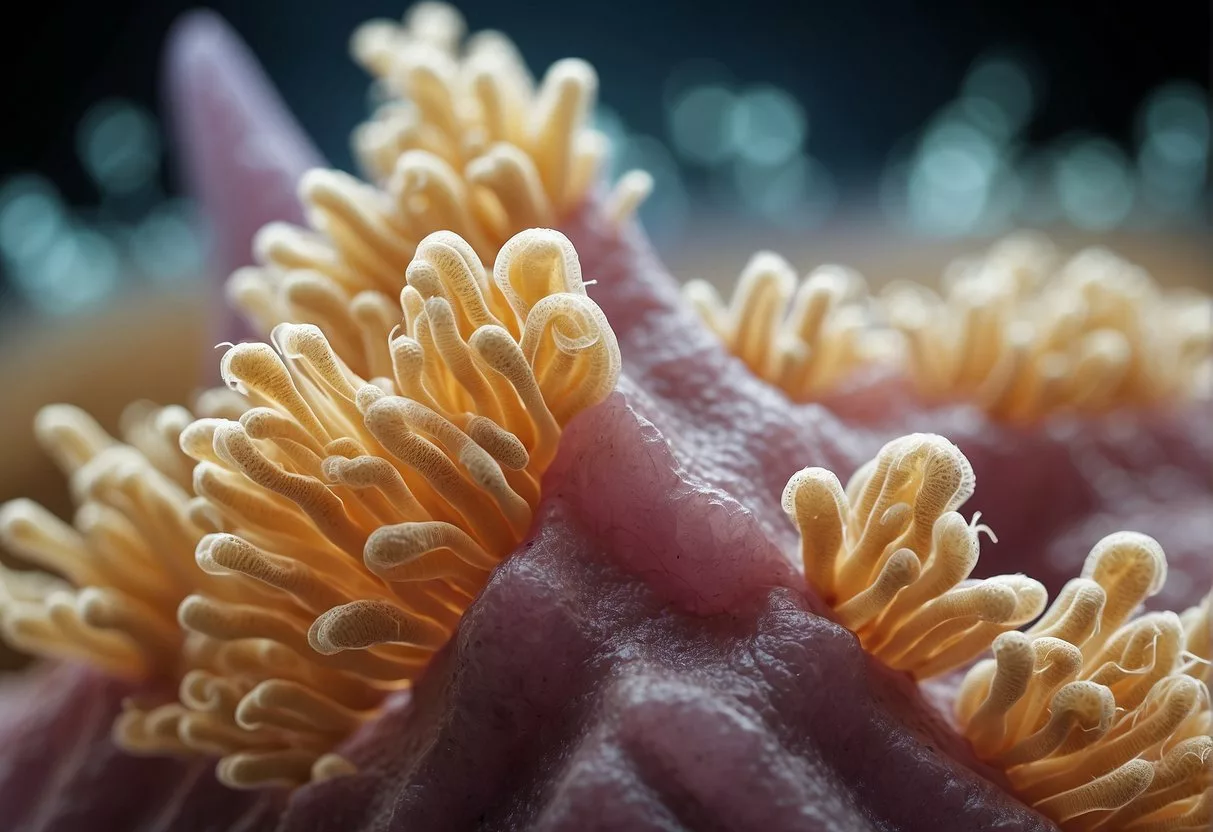
Incorporating dental probiotics into oral care routines might offer a natural approach to enhance oral health. They are administered in various forms, including lozenges, gums, mouthwashes, and even toothpaste.
The positive effects of these probiotics on oral health have been supported by emerging clinical studies. These studies underscore their benefits, from reducing the incidence of dental caries to improving gum health.
Key Takeaways
- Dental probiotics support the balance of the oral microbiome for improved oral health.
- Probiotics for dental care are available in multiple forms and are backed by clinical research.
- The use of these beneficial bacteria may prevent common dental issues like cavities and gum disease.
The Oral Microbiome

The oral microbiome is a complex ecosystem of bacteria that plays a critical role in both oral and overall health. This ecosystem comprises various species of microorganisms that interact continuously with each other and the host.
Composition of Oral Bacteria
The oral cavity harbors a diverse community of microorganisms, including bacteria, fungi, viruses, and protozoa.
Within this community, oral bacteria are the most abundantly researched. Bacteria in the oral microbiome can be broadly classified into beneficial (good bacteria) and harmful (bad bacteria).
These good bacteria contribute to maintaining oral health by aiding in digestion and protecting against the invasion of harmful pathogens. Conversely, the bad bacteria are often associated with oral diseases such as dental caries, periodontal disease, and can contribute to systemic health issues when overgrowth occurs.
Influence on Overall Health
The oral microbiome is not isolated to the mouth; it has a profound influence on overall health.
A stable and balanced oral microbiome protects against oral diseases, while a disrupted balance, termed dysbiosis, can increase the risk of disease.
The relationship between the oral microbiome and systemic health is bidirectional. For example, changes in the oral microbiome can signal or contribute to conditions such as cardiovascular disease, diabetes, and other inflammatory conditions. On the other hand, systemic health conditions can also influence the composition of the oral microbiota, often exacerbating oral health problems.
Fundamentals of Dental Probiotics
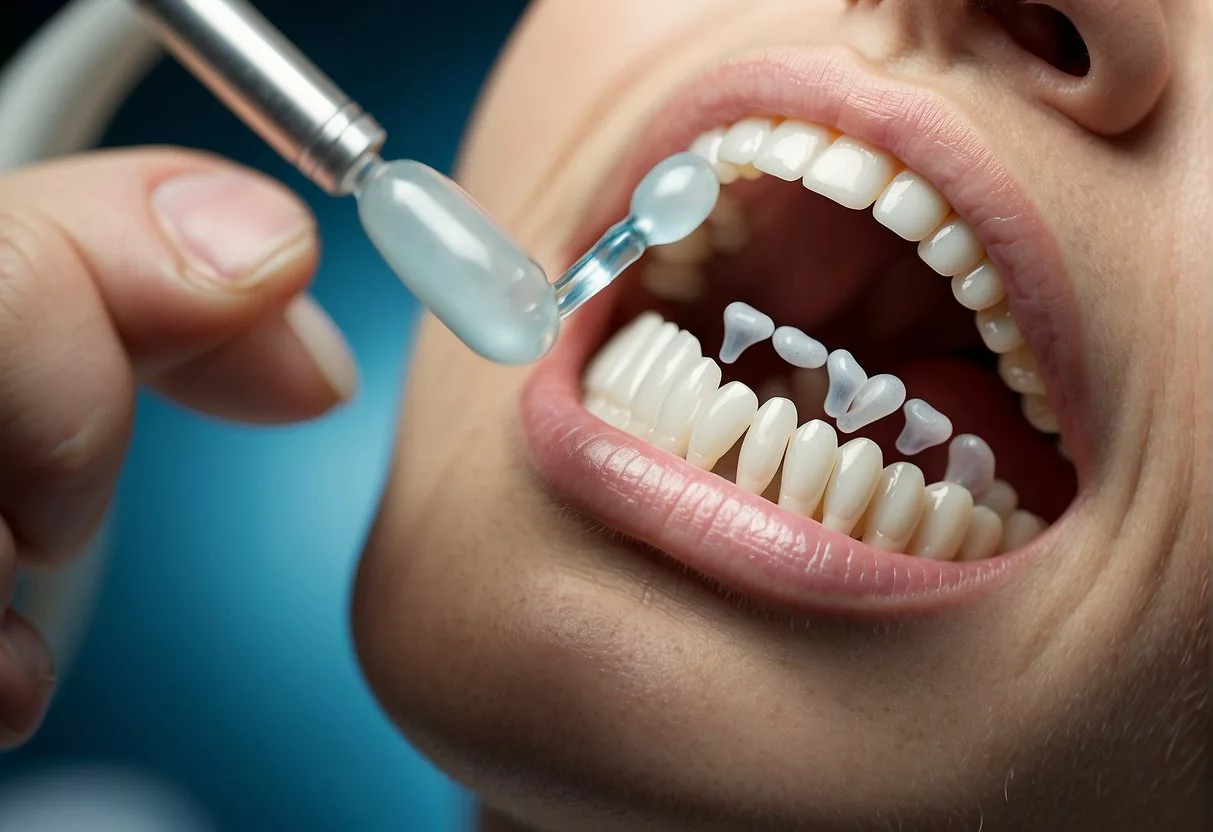
Dental probiotics, specifically formulated for oral health, introduce beneficial bacteria into the mouth to support a balanced oral microbiome. These probiotics compete with harmful bacteria, promoting dental health and potentially reducing the risk of common dental issues.
Probiotic Strains and Their Roles
Several probiotic strains play pivotal roles in maintaining oral health:
- Lactobacillus reuteri: Inhabits the mouth and gut, known to combat cariogenic bacteria like Streptococcus mutans.
- Streptococcus salivarius K12 and M18: These strains are naturally occurring in the oral cavity and can produce substances that inhibit pathogenic bacteria, aiding in the prevention of sore throats, ear infections, and bad breath.
- L. acidophilus and S. thermophilus: Often found in combination, these strains support a healthy oral environment and work together to reduce the growth of S. mutans.
- Lactobacillus paracasei: Has shown potential in managing symptoms of periodontal diseases.
- L. casei: Believed to modulate the oral microbiome and improve oral health.
- Lactobacillus rhamnosus: Known for its ability to adhere to oral mucosa and teeth, competing with unwanted microbes.
Mechanisms of Probiotic Action
The action of dental probiotics occurs through several mechanisms:
- Competition for Nutrients and Space: Probiotics compete with pathogenic bacteria for the same resources, effectively inhibiting the growth of harmful strains.
- Production of Antimicrobial Substances: Some probiotics produce bacteriocins and hydrogen peroxide, which can kill or inhibit pathogenic bacteria.
- Biofilm Formation: Probiotic strains can form biofilms that prevent the adherence of pathogens to dental surfaces, reducing plaque formation.
- Immune Modulation: Probiotics can enhance the local immune response, improving the oral cavity’s defense against pathogens.
Benefits of Dental Probiotics
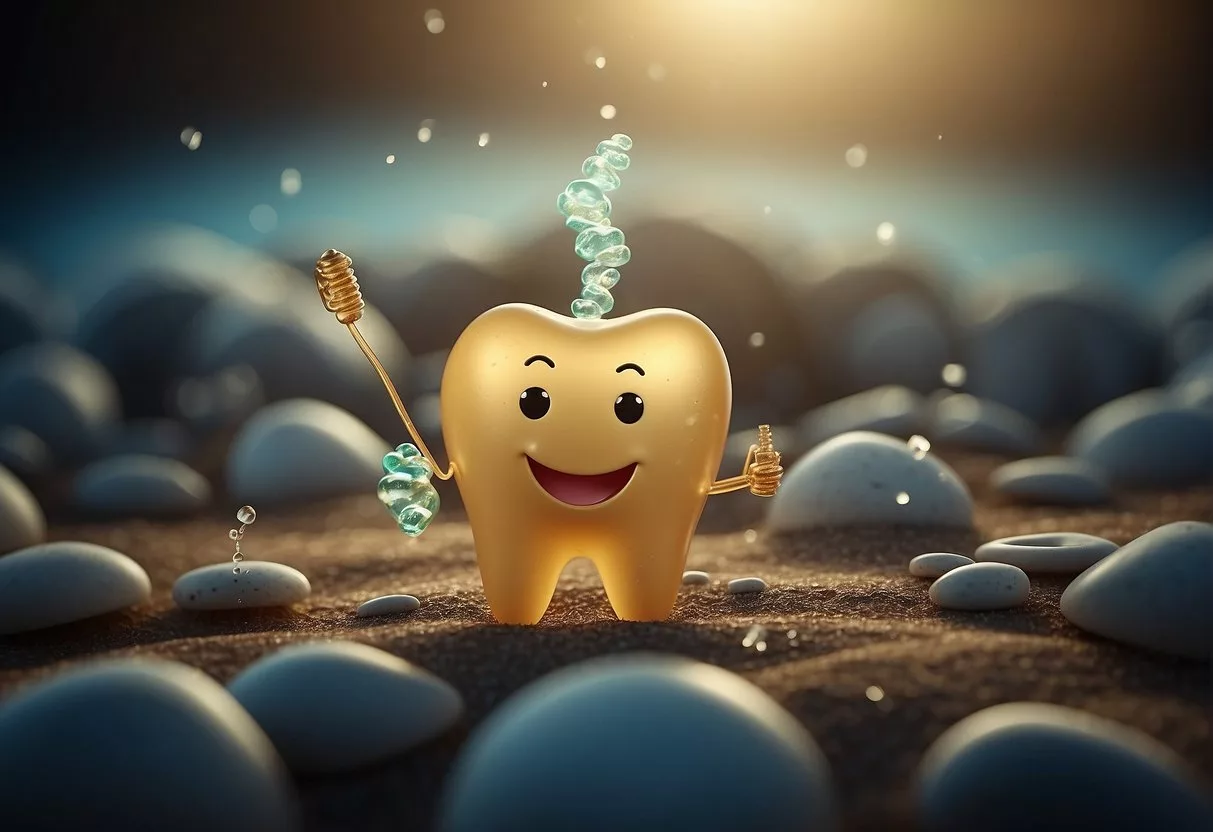
Dental probiotics are designed to introduce beneficial bacteria into the mouth, helping to maintain a balanced oral microbiome. They offer a range of health benefits, from reducing the risk of common oral diseases to promoting fresher breath.
Combatting Oral Diseases
Infections and diseases: Dental probiotics can curb the growth of harmful bacteria that cause common oral diseases such as caries and periodontal disease. By doing so, they play a significant role in preventing the onset of gingivitis, a precursor to periodontitis.
- Biofilm formation: These beneficial bacteria compete with the pathogens often found in biofilm, a substance that leads to plaque accumulation.
Enhancing Gum and Tooth Health
Improved gum health: Regular use of dental probiotics has been linked to a better gingival index, indicating healthier gums.
- Tooth preservation: By controlling decay and plaque, probiotics help protect teeth from caries and the resulting inflammation that can damage tooth structure.
Contribution to Fresh Breath
Combating halitosis: Probiotics can help alleviate bad breath or halitosis by neutralizing foul odors generated by certain bacterial activities in the mouth.
- Refreshing saliva: The introduction of beneficial bacteria can enhance the quality of saliva, making it more effective at washing away food particles and maintaining a neutral pH balance, key factors in maintaining fresh breath.
Application of Dental Probiotics
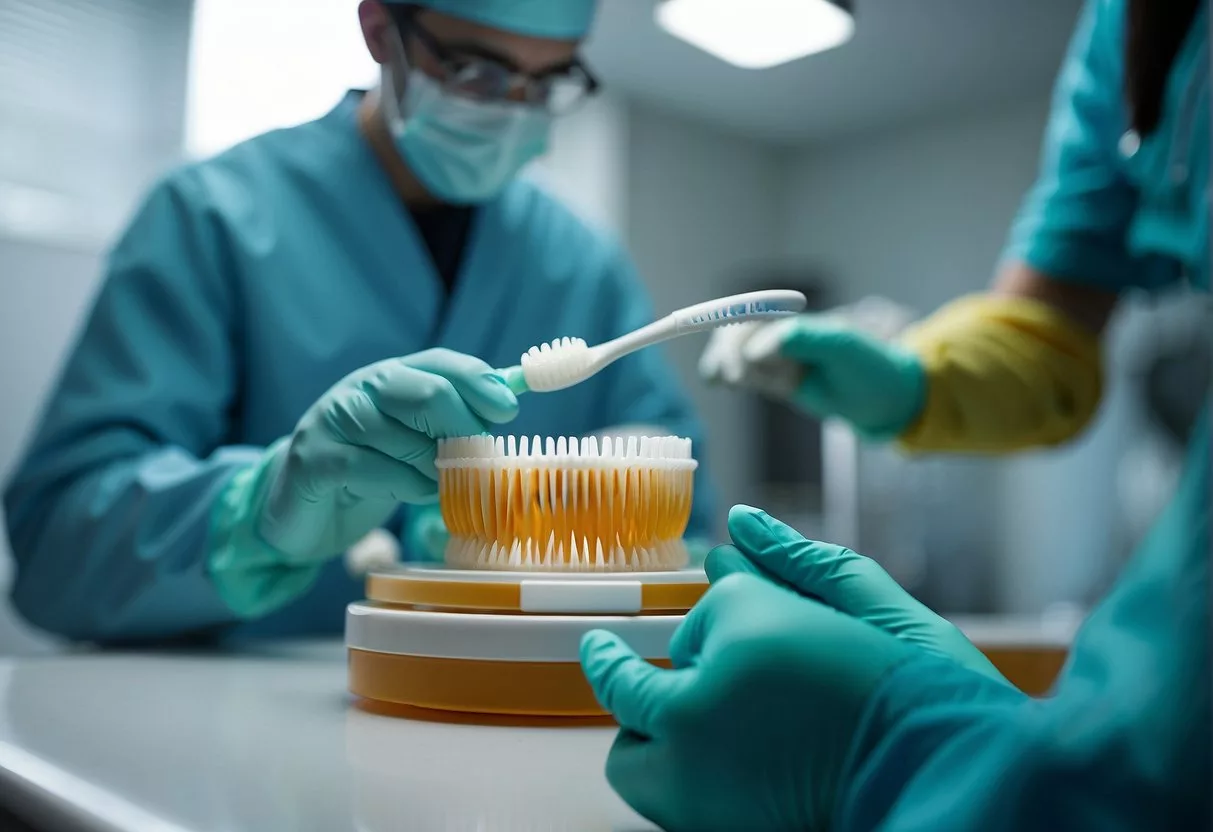
Dental probiotics are designed to enhance oral health by introducing beneficial bacteria into the oral cavity. These products may help in balancing the microbiome of the mouth, potentially leading to better dental health outcomes.
Probiotic-Containing Products
Lozenges: One popular form of dental probiotics is lozenges, which slowly release bacteria as they dissolve. These can be taken regularly to help maintain a healthy balance of oral flora.
Mouthwash: Some mouthwash products now contain probiotics in a liquid form, aiming to reach parts of the mouth that brushing might miss.
Supplements: Probiotic supplements may come in chewable tablets, allowing for direct contact with the teeth and gums. These tablets not only deliver probiotics to the oral environment but also encourage the production of saliva, which is vital for neutralizing acids and cleaning the mouth.
Dietary Sources of Probiotics
Yogurt: A daily intake of yogurt, which contains natural probiotics, is thought to contribute to oral health.
Fermented Foods: Foods such as kefir, sauerkraut, kimchi, and kombucha are known for their rich probiotic content. Including these in one’s diet can support the health of the oral microbiome.
Integration into Daily Oral Care
Regular brushing and flossing are foundational to oral health. Integrating dental probiotics into this routine can be as simple as choosing a toothpaste that includes probiotics or ending the routine with a probiotic-rich mouthwash.
Clinical Studies and Research Evidence

Clinical studies have provided insights into the ability of probiotics to maintain a healthy balance in the oral microbiome and their potential systemic health benefits. Researchers have focused on specific dental conditions and the wider implications for overall health.
Impact on Dental Health Conditions
Dental Caries and Cavities: Probiotics have been studied for their efficacy in reducing the incidence of dental caries. A systematic review has shown that probiotics may prevent cavities by ousting harmful bacteria and disrupting dental plaque formation.
- Tooth Decay: Studies suggest probiotics can slow tooth decay progression by influencing the microbial balance in the mouth.
- Oral Malodour: Certain strains of probiotics have been associated with a reduction in oral malodour through the inhibition of volatile sulfur compound-producing bacteria.
Dental Plaque: Probiotics are posited to compete with pathogenic bacteria in dental plaque, thus potentially lessening plaque accumulation and promoting oral health.
Oral Cancer: Research is still in early stages, but some findings indicate that probiotics might even have a role in reducing inflammation that could lead to precancerous conditions in the mouth.
Probiotics and Systemic Health
Overall Health: The oral cavity is an entry point for bacterial pathogens that could affect systemic health. Probiotics may therefore not only improve oral health but also contribute to better overall health.
Antibiotics: The use of antibiotics can disrupt the microbial balance in the mouth. However, probiotics have been observed to restore beneficial bacteria.
Aging: As people age, the natural balance of oral microbes can be disrupted. Probiotics could play a role in maintaining oral health during aging.
Cardiovascular Disease: Some studies, such as a meta-analysis, suggest a correlation between oral health and cardiovascular disease. This indicates that improving oral health with probiotics could reduce cardiovascular risks.
Respiratory Infections: Probiotics may also reduce the risk or severity of respiratory infections. This includes pneumonia, tonsillitis, strep throat, and general respiratory infections by inhibiting pathogenic oral bacteria.
Pregnancy: The use of probiotics during pregnancy has shown potential in reducing the risk of dental issues. This, in turn, may affect the mother’s general health and pregnancy outcomes.
Challenges and Considerations
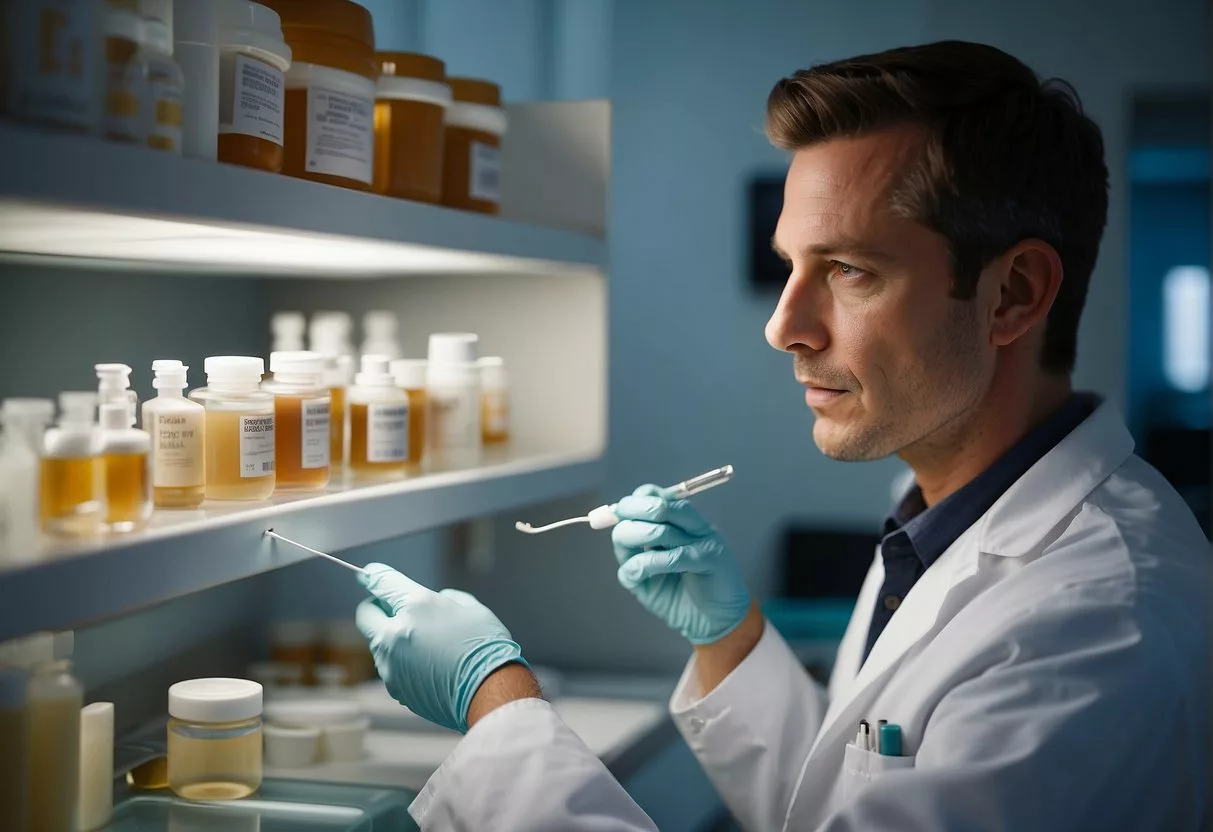
Splitting text into at most two sentences per paragraph.
While dental probiotics offer promising benefits for oral health, there are challenges and considerations that need to be addressed to ensure their safe and effective use.
Potential Side Effects
Dental probiotics, though beneficial in managing oral microbiota, may present potential side effects. For instance, individuals taking probiotics containing L. rhamnosus could experience digestive system discomfort if these organisms adversely affect gut health. Immunocompromised patients should be particularly cautious, as introducing live bacteria can sometimes lead to systemic infections.
Efficiency in Various Populations
The effectiveness of dental probiotics in preventing issues like tooth decay, dysbiosis, and bleeding gums can vary among different populations.
For example, the benefits seen in reducing pocket depth may not be equally significant in those with obesity or existing bone loss.
Moreover, the ability of probiotics to combat bad bacteria and disrupt harmful biofilms depends on the existing health of the individual’s oral ecosystem.
Certain populations, like those who consume milk containing probiotics or use toothpaste with BLIS K12, might experience varying levels of efficiency in maintaining enamel integrity and curbing conditions like tonsil stones.
Future of Dental Probiotics

Splitting text into at most two sentences per paragraph.
The horizon in dental health points towards a more preventive approach, with dental probiotics playing a pivotal role.
Research suggests that particular strains like Lactobacillus salivarius, Lactobacillus plantarum, and Lactobacillus brevis could be instrumental in maintaining a balanced oral flora.
These beneficial bacteria have shown promise in mitigating gum disease and offering various health benefits.
The focus of innovation in this field is on enhancing the efficacy and delivery methods of these probiotics.
Efforts are underway to tailor probiotic formulations that can effectively colonize the oral cavity. This ensures a sustained presence that could inhibit the growth of pathogenic bacteria.
| Strain | Potential Benefit |
|---|---|
| Lactobacillus salivarius | Improves oral flora balance |
| Lactobacillus plantarum | Reduction in gum inflammation |
| Lactobacillus brevis | Enhances overall oral health |
Current research is exploring the integration of these strains into daily dental care products, such as toothpaste and mouthwash.
This presents an opportunity for dental probiotics to become a regular part of oral hygiene routines, providing a proactive defense against dental issues.
Further studies are required to determine the optimal strains and concentrations needed to confer the greatest benefits.
As understanding deepens, dental probiotics could potentially lead to personalized oral health care solutions, targeted specifically to an individual’s unique microbiome.
The goal is clear: to leverage the symbiotic relationship between humans and their microbiota for better overall health, starting with the mouth.
Conclusion
Dental probiotics have begun to emerge as a supplementary measure in maintaining oral health. These supplements contain strains of beneficial bacteria aimed at creating a balance within the oral microbiome.
As the research suggests, maintaining a healthy oral microbiome is pivotal in preventing common dental issues such as cavities, gum disease, and bad breath.
They are not a replacement for traditional oral care but rather an adjunct to enhance it.
The beneficial bacteria in dental probiotics can promote a healthy balance of microorganisms in the mouth, potentially warding off pathogenic bacteria responsible for oral diseases.
However, the efficacy of these supplements is not universally established. Clinical evidence is varied, with some studies supporting their benefits while others call for more robust research to affirm their effect on dental health.
Consumers considering dental probiotics should consult with a dental professional to understand if they are suitable for their individual health needs.
It’s also important to ensure that the chosen products contain strains of bacteria that have been studied and shown to be effective for oral health.
Frequently Asked Questions
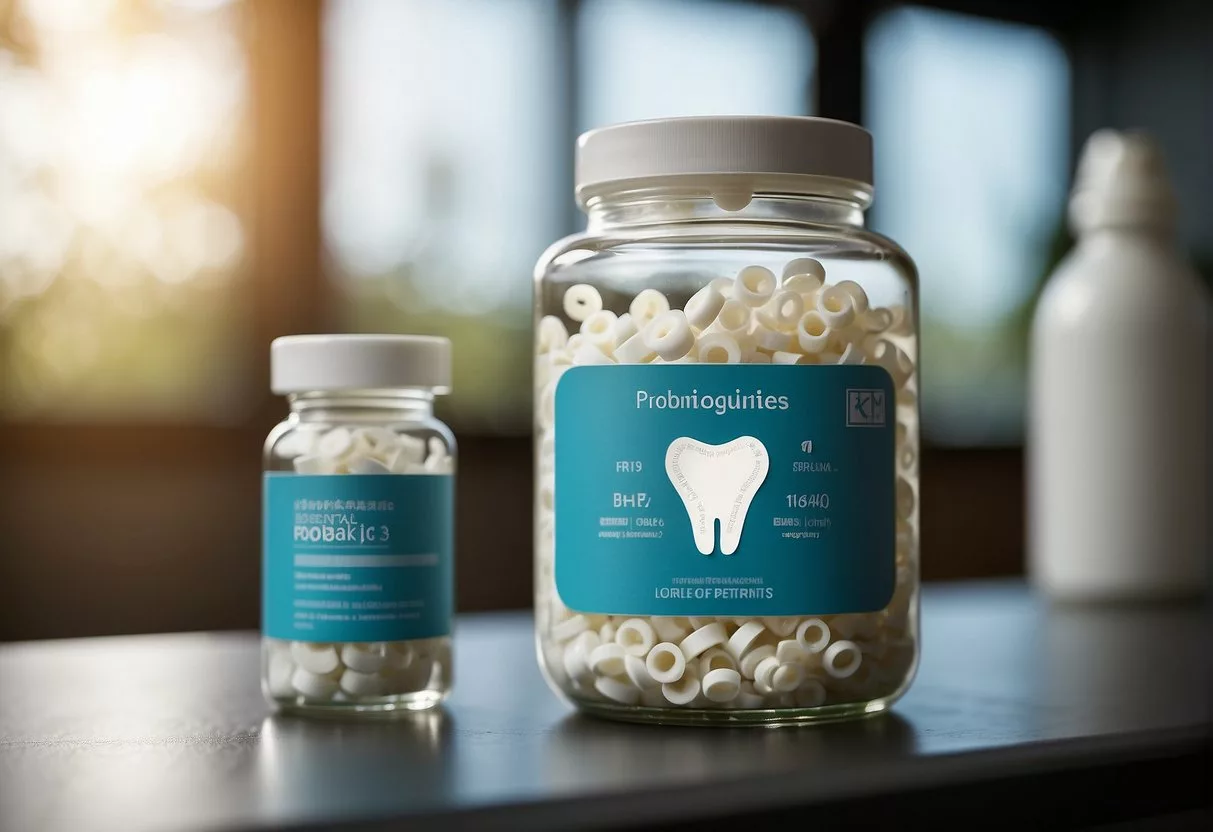
The following subsections address specific queries regarding the effectiveness, benefits, and usage of dental probiotics, providing essential insights for anyone considering integrating these supplements into their oral healthcare routine.
Which dental probiotic strains are most effective for oral health?
Dental probiotics containing strains such as Lactobacillus and Bifidobacterium are recognized for their beneficial impact on oral health. These strains have been extensively studied and shown to contribute effectively to the balance of the oral microbiome.
How does using probiotics for gum disease improve oral health?
Probiotics for gum disease work by introducing beneficial bacteria into the mouth which can help to restore balance to the oral microbiome, potentially decreasing the prevalence of harmful bacteria that contribute to gum diseases like periodontitis and gingivitis.
What are the proven benefits of taking dental probiotics?
Dental probiotics have been shown to assist in preventing oral diseases, reducing the incidence of bad breath, and improving overall gum health. Consistent use of these probiotics can play a part in a comprehensive oral hygiene regimen.
Can children safely take dental probiotics, and are there specific formulations for them?
Children can take dental probiotics, but it is important to choose products specifically formulated for their use. These formulations are designed to ensure both safety and efficacy for the unique needs of a child’s developing oral microbiome.
How soon can one expect to notice improvements in oral health after starting dental probiotics?
The time frame for observing improvements can vary; however, some individuals may notice changes in oral health within a few weeks of consistent use. Factors such as the individual’s existing oral health condition and adherence to proper usage play a significant role.
Are there distinct advantages in choosing dental probiotics over traditional probiotics for oral care?
Dental probiotics are specially formulated to target the oral cavity. They have advantages for oral health that traditional gut-targeted probiotics may not provide.
The strains used in dental probiotics are selected for their ability to adhere to oral surfaces. They also affect the oral microbiome directly.
